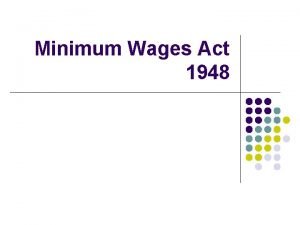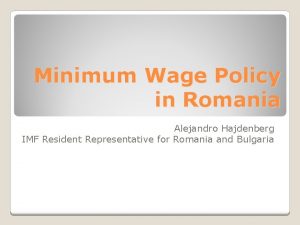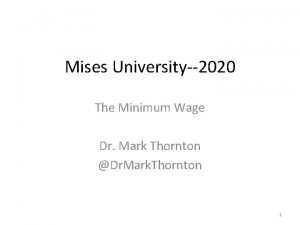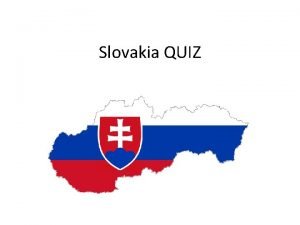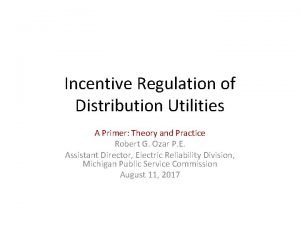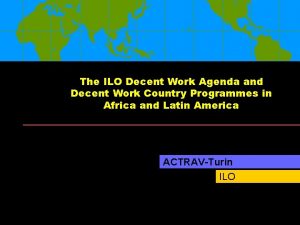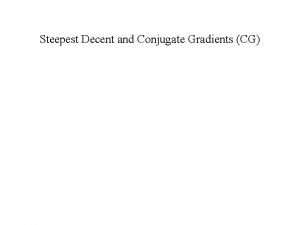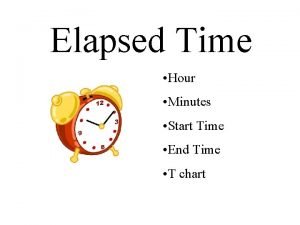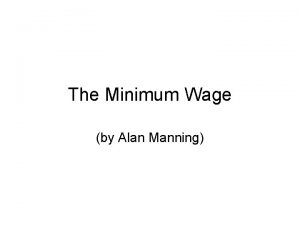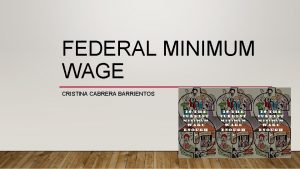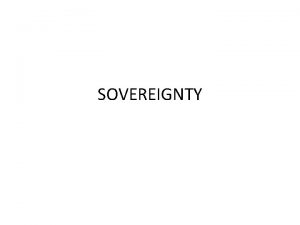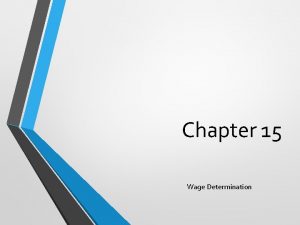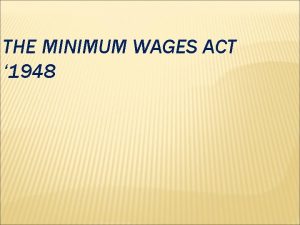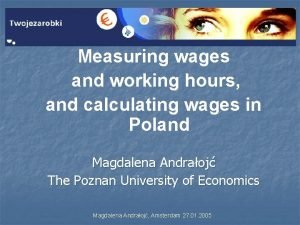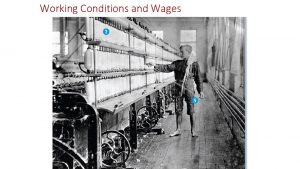The Minimum Wage Decent Wages and Time Sovereignty























- Slides: 23

The Minimum Wage, Decent Wages, and Time Sovereignty in the European Union Kathleen Ragon Sociology Honors Thesis Gettysburg College April 26 th, 2013

General Question What is the relationship between working time and the minimum wage in the European Union?

Twin Goals: Time and Money Goal 1: minimal material prosperity “All workers have the right to a fair remuneration sufficient for a decent standard of living for themselves and their families. ” European Social Charter (1996) Goal 2: time sovereignty “Every worker has the right to limitation of maximum working hours, to daily and weekly rest periods and to an annual period of paid leave. ” Article 31, Charter of Fundamental Rights of the European Union (2000)

Research Questions RQ 1: Is the fulfillment of both of these twin goals possible for minimum wage workers? v Minimal material prosperity operationalized as poverty threshold v Time sovereignty operationalized as one full-time job or less per worker in income unit RQ 2: Does the ability to meet these goals change over time?

Background 20 EU countries with national statutory minimum wages (Belgium, Bulgaria, Czech Republic, Estonia, France, Greece, Hungary, Ireland, Latvia, Lithuania, Luxembourg, Malta, Netherlands, Poland Portugal, Romania, Slovakia, Slovenia, Spain, United Kingdom)

Literature Review Unemployment effects: little to no effect, positive or negative 1 - studies of France, Spain, the Netherlands, and the UK. Inequality and Poverty Effects: mixed results 2 - some studies found a positive impact on low pay and wage dispersion, others nil. - “The honest conclusion is that there remains very considerable uncertainty about the true impact of the NMW. ” (Manning & Dickens 2002) Vision of Social Europe: a decent standard of living 3 - EU countries should “have the goal of implementing a framework in which national minimum wages would be protected from erosion and the lowest-paid workers in each European country assured a decent standard of living and their societies a minimum of social cohesion. ” (Schulten & Watt 2007) Working Time: employer perspective 4 - almost no studies of working time from the employee perspective 1. Dolado et al. (1996), Machin & Manning (1997), Stewart (2004), Metcalf (2008), Low Pay Commission Report (2012) 2. Machin & Manning (1997), Machin et al. ( 2003), Lucifora et al. (2005), Dickens & Manning (2004), Metcalf (2008), Fanti & Gori (2011) 3. Schulten et al. (2005), Schulten & Watt (2007), Schulten (2008), Levin-Waldman (2003), European Commission (2010) 4. Metcalf (2008), Robinson & Wadsworth (2007)

Analytical Framework Marx “Time is the room of human development” (1844: 422). “Capital is dead labour which, vampire-like, lives only by sucking living labour, and lives the more, the more labour it sucks…the capitalist appetite for surplus labour appears in the drive for an unlimited extension of the working day” (1867: 342, 346) Polanyi Instability as social dislocation.

Analytical Framework EU Policy The EU embeds these ideas in its policy by protecting workers’ time and guaranteeing workers (at least in theory) a ‘decent wage. ’ (European Social Charter and the Charter of Fundamental Rights of the European Union) Long hours (+48/week) shown to be detrimental to workers’ health and safety 1 1. (e. g. Schor 1993, Eurofound 2003, Seo 2011, Wirtz & Nachreiner 2010, Working Time Developments 2009, A New Organization of Time over Working Life 2003)

Methods Data collected from USDOS Country Reports on Human Rights Practices, Eurostat, OECD, and ILO databases. Minimum wage levels Poverty thresholds Vacation time Labor laws (standard workweek, etc. )

Methods: Working Units Single worker (one worker earning 100% of the minimum wage) Four Person Family (two adults, each earning 100% of the minimum wage and two children under the age of 14)

Methods – Example Calculation Hours worked weekly to achieve the poverty threshold: Single worker in Belgium (2011) 38 hour standard workweek * 4 weeks/month = 152 hours/month € 1415. 24 monthly minimum wage/152 hours/month = € 9. 31/hour € 12, 005. 00 poverty threshold/€ 9. 31 hourly minimum wage = 1289. 47 hours per year (1289. 47 yearly hours – 240 mandatory yearly vacation hours)/46 standard yearly work weeks = 22. 81 hours worked per week

Results RQ 1: 3 Groups Group 1: Reasonable (Part-time job) Single Worker: 20 – 30 hours to earn the poverty threshold 4 Person Family: 40 – 60 hours to earn the poverty threshold Feasible fulfillment of the twin goals Group 2: Precarious (Full-time job or slightly less) Single Worker: 30 – 40 hours to earn the poverty threshold 4 Person Family: 60 – 80 hours to earn the poverty threshold Fulfillment of the twin goals with limited time sovereignty Group 3: Unreasonable (> Full-time job) Single Worker: 40+ hours to earn the poverty threshold 4 Person Family: 80+ hours to earn the poverty threshold Fulfillment of the twin goals is unreasonable or impossible

Results Is fulfillment of the twin goals possible? Table 1. Number of 40 -hour Workweeks to Achieve Poverty Threshold (2010) Group 1 Group 2 Group 3 Country France Ireland Belgium Poland Greece Romania Netherlands Portugal Hungary Malta Lithuania Spain Latvia* Luxembourg United Kingdom Slovenia Slovakia Estonia^ Czech Republic Bulgaria Single Worker 0. 53 0. 56 0. 60 0. 61 0. 62 0. 68 0. 69 0. 78 0. 81 0. 84 0. 87 0. 90 0. 91 0. 95 1. 09 1. 15 *Latvia falls into Group 1 in the case of a single worker. ^Estonia falls into Group 3 in the case of a four person family. Four Person Family 1. 32 1. 33 1. 36 1. 37 1. 45 1. 60 1. 82 1. 32 1. 94 1. 95 1. 98 1. 86 2. 08 2. 45 2. 50

Results How does this relationship change over time? Weekly Hours Worked for the Poverty Threshold Single Worker 1999 -2011 60 Belgium Romania Portugal Greece Netherlands Malta Ireland France Poland Luxembourg United Kingdom Slovakia Slovenia Lithuania Latvia Spain Estonia Czech Republic Bulgaria Hungary 50 Total Weekly Hours 40 30 20 10 0 1999 2000 2001 2002 2003 2004 2005 2006 2007 2008 2009 2010 2011

Example Group Change

Results: Qualitative Measure of Change Table 2. Poverty Country Groups and Volatility Scores Total Group Changes Country Single Worker France 0 Ireland 0 Belgium 0 Poland 0 Greece 0 Group 1 Romania 0 Netherlands 0 Portugal 0 Hungary 6 Malta 0 Lithuania 1 Spain 2 Latvia 1 Luxembourg 0 Group 2 United Kingdom 0 Slovenia 1 Slovakia 0 Estonia 2 Czech Republic 1 Group 3 Bulgaria 4 Total Group Changes Four Person Family 0 0 0 0 2 0 3 4 4 0 5 3 4 4 2 3

Results: Volatility Table 3. Volatility Score and Average Hours Worked Weekly for Poverty Threshold (1999 -2011) Country Single Worker Four Person Family Belgium 0. 58 (22. 14) 1. 22 (52. 24) Romania 0. 78 (24. 34) 1. 64 (56. 85) Luxembourg 0. 95 (33. 28) 2. 00 (76. 53) Group A Portugal 1. 22 (27. 35) 2. 57 (64. 29) (Volatility <5% of Greece 1. 23 (23. 63) 2. 59 (53. 28) standard 40 -hour Netherlands 1. 45 (23. 84) 3. 05 (56. 02) workweek) Malta 1. 62 (27. 38) 3. 39 (63. 90) Ireland 1. 67 (26. 37) 3. 50 (60. 89) France 1. 84 (18. 71) 3. 86 (47. 54) United Kingdom 2. 06 (35. 53) 4. 31 (79. 93) Slovakia 2. 19 (34. 35) 4. 59 (75. 80) Spain 2. 26 (31. 75) 4. 74 (73. 74) Group B Slovenia 2. 36 (33. 63) 4. 95 (74. 28) (Volatility 5 -10%) Poland 2. 48 (25. 15) 5. 22 (56. 49) Estonia 3. 27 (35. 41) 6. 86 (78. 03) Lithuania 3. 74 (30. 72) 7. 85 (71. 12) Latvia 4. 09 (35. 37) 8. 58 (77. 95) Group C Hungary 4. 19 (30. 11) 9. 23 (63. 76) (Volatility >10%) Czech Republic 5. 06 (38. 48) 10. 62 (87. 20) Bulgaria 7. 71 (42. 34) 16. 20 (92. 58)

Results: Poverty Groups vs. Volatility Groups Table 5. Poverty Country Groups and Volatility Scores Poverty Group 1 Poverty Group 2 Country France Ireland Belgium Poland Greece Romania Netherlands Portugal Hungary Malta Lithuania Spain Latvia Luxembourg United Kingdom Slovenia Slovakia Estonia Czech Republic Volatility Group Single Worker A A A B A A C A B B B B C Volatility Group Four Person Family A A A B A A C A B B B B C

Take-aways There is considerable variability in the ability of minimum wage workers in the EU to meet the twin goals of minimal material prosperity and time sovereignty. Especially in those countries where achievement of the twin goals is already precarious or unreasonable, the ability of minimum wage workers to meet the twin goals is variable over time. Thus, the actual situation in the EU is not internally consistent with its rhetoric of the twin goals of minimal material prosperity and time sovereignty; in some countries minimum wage workers are excluded from the right to have both a decent standard of living and time sovereignty.

Possible Solutions For those countries where achievement of the poverty threshold (and thus the twin goals) is precarious or unreasonable, increase the minimum wage to a level that allows minimum wage workers to reasonably earn the poverty threshold. For those countries with high volatility, re-evaluate the method for uprating the minimum wage. Follow the example of France where the value of the minimum wage is pegged to inflation.

Research from the Future This is a theoretical study, so in practice, how does this affect minimum wage workers? Who composes the group “minimum wage workers”? Does this preponderantly affect women, migrant workers, etc. ? Comparison of the amount of hours for each country to its relative ‘market freeness’ measure - do countries with freer markets also have higher necessary hours? How do minimum wage workers in countries where the minimum wage is collectively bargained compare to countries with national statutory minimum wages? How do the amount of hours necessary to earn the poverty threshold in a given country compare to the level of social support/welfare provided in that country?

Conclusion TIME IS IMPORTANT.

Gratitude and Thanks to… Professor Craig Lair Gettysburg College Sociology Department Professor Sandra Gill Professor Emelio Betances Andrew W. Mellon Foundation Gettysburg College Provost’s Office
 The minimum wage act 1948
The minimum wage act 1948 The minimum wage act 1948
The minimum wage act 1948 Proposal for a directive on adequate minimum wages
Proposal for a directive on adequate minimum wages Croatia minimum wage
Croatia minimum wage Minimum wage argument
Minimum wage argument Average wage in romania
Average wage in romania Minimum wage essay outline
Minimum wage essay outline Mises minimum wage
Mises minimum wage Slovakia quiz
Slovakia quiz Liberals vs conservatives minimum wage
Liberals vs conservatives minimum wage Impact of contemporary issues to the filipino entrepreneurs
Impact of contemporary issues to the filipino entrepreneurs Disadvantage of raising minimum wage
Disadvantage of raising minimum wage Absolute maximum and minimum
Absolute maximum and minimum What is time rate wage system
What is time rate wage system Arc shot
Arc shot Coordinate decent
Coordinate decent Playing a decent game of table tennis
Playing a decent game of table tennis Coordinate
Coordinate Ilo decent work agenda
Ilo decent work agenda Decent manner
Decent manner Steepest decent
Steepest decent Decent with modification
Decent with modification What is elapsed time
What is elapsed time Wages and salary administration
Wages and salary administration
